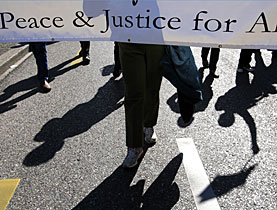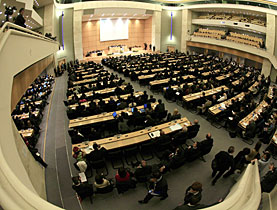Anti-racism summit ends with a small miracle

Despite a rancorous atmosphere and disorderly scenes, the United Nations anti-racism summit in Geneva ended on a miraculously positive note, say human rights experts.
The carefully drafted anti-racism declaration shows it is still possible to secure international consensus over such an extremely sensitive issue, they claim.
The week-long Durban Review Conference, dubbed Durban II, started on a sour note on Monday when Iran’s President Mahmoud Ahmadinejad called Israel a “totally racist regime” and accused the West of using the Holocaust as a “pretext” for aggression against Palestinians.
This prompted all 23 European Union countries present in Geneva to walk out of the conference hall in protest. All but one, the Czech Republic, later rejoined the conference.
Diplomats then quickly shook off the disruption from Ahmadinejad’s address and on Tuesday approved an anti-racism declaration that emphasised prejudice and inequalities affecting ethnic minorities, foreign workers, refugees and the poor.
For Swiss human rights experts the laborious negotiation of each word and paragraph in the final anti-racism declaration did not result in an incoherent and empty text.
“The declaration is not a major document. But it’s a good text which at least doesn’t represent a backwards step in human rights terms,” Adrien-Claude Zoller, the director of the non-governmental organisation, Geneva for Human Rights, told swissinfo.
Zoller was struck by the mobilisation of the Europeans, including Switzerland.
“This time the Europeans, who were in the minority, put all their efforts and energies into it,” he said.
Human Rights Watch, the biggest international non-governmental organisation involved in Durban II, supported this view.
“The antagonism between western and Muslim countries, which has grown since 2001 to the detriment of Muslim minorities, was overcome. This document sends a message of unity and tolerance. It also shows the isolation of the Iranian president,” said Juliette Rivero, director of Human Rights Watch’s Geneva office.
Solid document
“From an anti-racism perspective, this text is a solid document,” said Rivero. “It should therefore be backed by the countries that boycotted the conference.”
The United States, along with Canada, Israel, Italy, Australia, New Zealand, Poland, the Netherlands and Germany decided to boycott Durban II over concerns that it would be used as a platform for criticism of Israel. Germany later changed its position and backed the declaration.
“The declaration puts freedom of expression at the centre of the fight against racism. Anti-Semitism is clearly condemned. The states are also clearly invited to respect human rights in the measures they take concerning migrants and illegal immigrants – a taboo subject in Durban in 2001,” said Rivero.
“Governments are urged to do more to fight rightwing extremist groups. There is also an appeal encouraging the integration of young people who have emigrated. And several paragraphs deal with the protection of women and domestic staff, whose rights are often violated,” she added.
States are not obliged to adhere to the anti-racism resolution. But the 182 governments that adopted the text have undertaken to implement the measures at the national level.
“NGOs will be able to bring states to account so that they respect their commitments,” said Rivero.
Zoller welcomed progress on strengthening the independent verification of state progress on the declaration.
Frustrations
Yet the Geneva text still lacks important elements.
There is no mention of a number of communities that are victims of discrimination, such as the untouchables of India and Japan, or homosexuals.
By refusing compensation for countries that were victims of slavery and colonialism, the West continues to fuel frustrations that will re-surface at the Human Rights Council or at another international body, say the experts.
The same goes for the Israeli-Palestinian conflict. On Thursday a dozen Arab NGOs criticised the fact that there was no mention of it in the final document.
Openness
Despite the ongoing divisions and the boycott by certain western states, the first tentative signs of openness of the new US president, Barack Obama, indicate an easing of international relations and commitment to human rights.
“The US president seems determined to want to secure a Middle East peace agreement within the next four years, alongside the creation of a viable Palestinian state,” said David Sylvan, professor at Geneva’s Graduate Institute.
Absent from the anti-racism conference in Geneva, the US announced on March 31 that it would seek a seat this year on the Human Rights Council with the aim of working to make it a “more effective body to promote and protect human rights”.
The next round of elections to the Council will be held on May 15 in the UN General Assembly in New York.
swissinfo, Frédéric Burnand and Simon Bradley in Geneva
The Swiss ambassador to the UN in Geneva, Dante Martinelli, said on Friday the Durban II conference had been generally positive.
He said the meeting had reaffirmed Geneva’s ability to hold international meetings, even those of a controversial nature.
Martinelli confirmed that the vast majority of countries – 182 out of 192 – had adopted the final document. He said the text had respected the strict rules laid down by the Swiss government governing its participation (ie. examining the implementation of the Durban Declaration and Programme of Action and not review the whole process; no new anti-racism norms and no focus on a specific geographic location, like the Israel-Palestine conflict) and had confirmed important principles.
The ambassador said extremist elements had been isolated and described the Iranian President Mahmoud Ahmadinejad’s speech on Monday as “reprehensible and contrary to the conference spirit and goals”.
Martinelli said he had remained in the conference room during Ahmadinejad’s speech, unlike 23 European delegates, as “you have to be there even if you don’t agree with what is said”.
Among the less positive points, he regretted the fact that plans for an anti-racism monitoring unit had been sidelined.
Michele Galizia, head of the anti-racism service at the interior ministry, confirmed the final document contained no new obligations for states but said the reaffirmation of the Durban Declaration and Plan of Action was “very important”.

In compliance with the JTI standards
More: SWI swissinfo.ch certified by the Journalism Trust Initiative














You can find an overview of ongoing debates with our journalists here . Please join us!
If you want to start a conversation about a topic raised in this article or want to report factual errors, email us at english@swissinfo.ch.